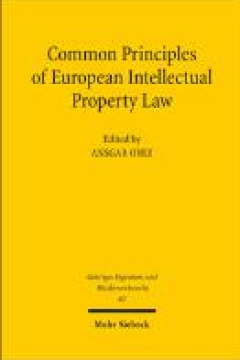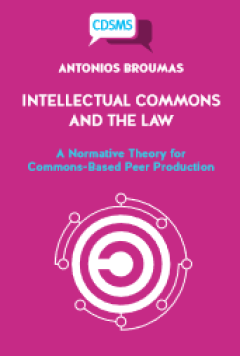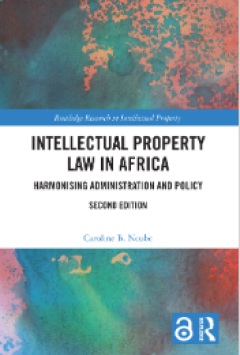Ditapis dengan

Common Principles of European Intellectual Property Law
Intellectual property law has been harmonized by EU law to a considerable extent. At the same time intellectual property rights have converged. The academic discussion has not kept pace with this development. European intellectual property law is often seen through the spectacles of national law; pan-European discussions about issues of Community law seem to be the exception rather than the rul…
- Edisi
- -
- ISBN/ISSN
- 978-3-16-156656-1
- Deskripsi Fisik
- 281 hlm.
- Judul Seri
- -
- No. Panggil
- -

Intellectual Commons and the Law: A Normative Theory for Commons-Based Peer P…
‘With clarity and sophistication, Antonios Broumas presents a bold new theory of intellectual commons and powerful arguments for a new body of supportive law. This book not only reveals the misleading logic of intellectual property law in our time; it reveals the rich possibilities for constructive change that legally protected commoning can bring. Highly recommended!’ — David Bollier, Di…
- Edisi
- -
- ISBN/ISSN
- 978-1-912656-88-2
- Deskripsi Fisik
- 223 hlm.
- Judul Seri
- -
- No. Panggil
- -

Intellectual Property Law in Africa: Harmonising Administration and Policy
Examining the harmonisation of Intellectual Property policy, law and administration in Africa, this book evaluates the effectiveness of efforts to establish continental Intellectual Property institutions and frameworks. It also considers sub-regional initiatives led by the regional economic communities and the regional Intellectual Property organisations, focusing on relevant protocols and agre…
- Edisi
- -
- ISBN/ISSN
- 978-1-003-31019-8
- Deskripsi Fisik
- 270 hlm.
- Judul Seri
- -
- No. Panggil
- -

The Future of Asian Trade Deals and IP
The first part of this open access book sets out to re-examine some basic principles of trade negotiation, such as choosing the right representatives to negotiate and enhancing transparency as a cure to the public’s distrust against trade talks. Moreover, it analyses how the Comprehensive and Progressive Agreement for the Trans-Pacific Partnership (CPTPP) might impact on the Regional Comprehe…
- Edisi
- -
- ISBN/ISSN
- 978-1-50992-278-9
- Deskripsi Fisik
- 317 hlm.
- Judul Seri
- -
- No. Panggil
- -

Digitization and the Law
New technologies mean new challenges for the law. The Internet is no longer new territory, but critical topics such as cyberattacks, privacy, the protection of minors and cloud computing have by no means been discussed. Increasing digitalization and technology are not limited to the World Wide Web. Automated road traffic is also a forward-looking topic whose development must be legally supported.
- Edisi
- -
- ISBN/ISSN
- 978-3-8452-8930-4
- Deskripsi Fisik
- 140 hlm.
- Judul Seri
- -
- No. Panggil
- -

The Cambridge Handbook of Investment-Driven Intellectual Property
This handbook challenges the conventional wisdom that intellectual property is the law of creativity. Traditionally, IP has been instrumental for protecting creations of the mind, with only inventors of original works enjoying exclusive rights. Related, sui generis, and quasi-IP rights, which protect monetary investments and efforts rather than originality and inventiveness, were considered exc…
- Edisi
- -
- ISBN/ISSN
- 978-1-108-83919-8
- Deskripsi Fisik
- 369 hlm.
- Judul Seri
- Cambridge Law Handbooks
- No. Panggil
- 346.04 Bon c
 Karya Umum
Karya Umum  Filsafat
Filsafat  Agama
Agama  Ilmu-ilmu Sosial
Ilmu-ilmu Sosial  Bahasa
Bahasa  Ilmu-ilmu Murni
Ilmu-ilmu Murni  Ilmu-ilmu Terapan
Ilmu-ilmu Terapan  Kesenian, Hiburan, dan Olahraga
Kesenian, Hiburan, dan Olahraga  Kesusastraan
Kesusastraan  Geografi dan Sejarah
Geografi dan Sejarah